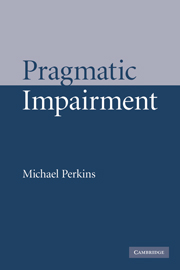Book contents
- Frontmatter
- Contents
- List of figures
- List of tables
- Acknowledgements
- Transcription conventions
- 1 Introduction
- 2 Pragmatic theory and pragmatic impairment
- 3 Pragmatics and modularity: components, dissociations and associations
- 4 Pragmatic ability and disability: an emergentist model
- 5 Cognition and pragmatics
- 6 Language and pragmatics
- 7 Sensorimotor systems and pragmatics
- 8 Compensatory adaptation
- 9 Conclusions
- Appendix
- References
- Index
9 - Conclusions
Published online by Cambridge University Press: 22 September 2009
- Frontmatter
- Contents
- List of figures
- List of tables
- Acknowledgements
- Transcription conventions
- 1 Introduction
- 2 Pragmatic theory and pragmatic impairment
- 3 Pragmatics and modularity: components, dissociations and associations
- 4 Pragmatic ability and disability: an emergentist model
- 5 Cognition and pragmatics
- 6 Language and pragmatics
- 7 Sensorimotor systems and pragmatics
- 8 Compensatory adaptation
- 9 Conclusions
- Appendix
- References
- Index
Summary
The main thesis of this book is that pragmatics is emergent. That is to say, it is not a discrete entity but the product of many interacting variables. When we communicate with others, we draw on a range of capacities including (a) signalling systems such as language, gesture and facial expression, (b) cognitive systems such as theory of mind, inference and memory, (c) motor output systems such as the vocal tract and hand movement, and (d) sensory input systems such as hearing and vision. All of these ‘elements’ exist within the individual – i.e. they constitute an intrapersonal domain, but during communication they combine with those of other individuals to form an interpersonal domain. Interpersonal communication involves many choices – for example, which meanings are explicitly encoded, and which left implicit; which signalling system(s) are used; which meanings are most salient and relevant. The exercise of such choices requires multiple interactions between the various underlying semiotic, cognitive and sensorimotor capacities both within and between individuals. Intrapersonal and interpersonal domains are dynamic systems whose integrity and equilibrium are maintained via a continuous process of compensatory adaptation. The effect of this is most plainly seen when one or more individual elements malfunction and create an imbalance within the system as a whole.
- Type
- Chapter
- Information
- Pragmatic Impairment , pp. 176 - 182Publisher: Cambridge University PressPrint publication year: 2007



